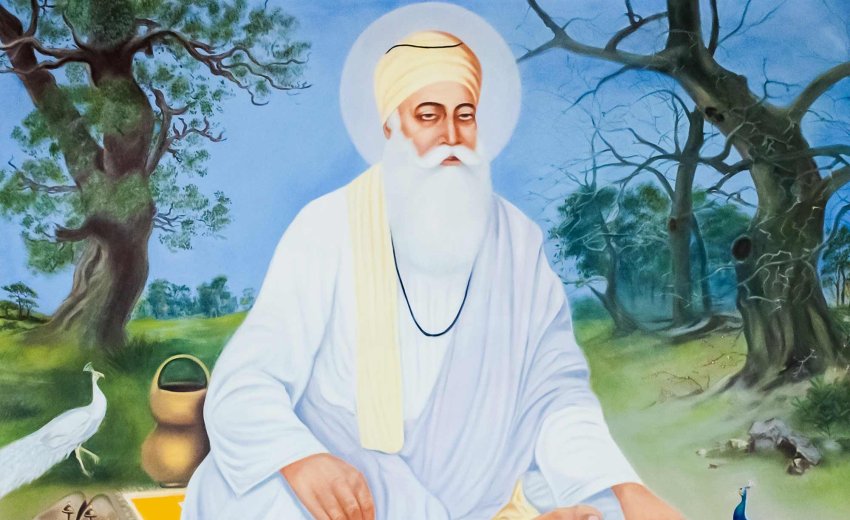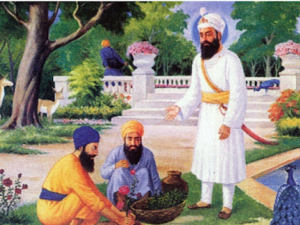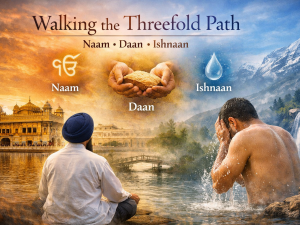Merriam-Webster dictionary defines an apostle as a person who initiates a great moral reform or who first advocates an important belief and system [1]. Similarly, the Cambridge dictionary states that an apostle is someone who strongly supports a particular belief or political movement [2]. The Free Dictionary by Farlex describes an apostle as a person who pioneers an important reform movement, cause, or belief; a passionate adherent; or a strong supporter.
In the light of the above meanings of the term ‘apostle’, one can easily say that Guru Nanak was an apostle as he initiated great moral and social reforms in the Indian society of his times, as is evident from his life and works. He promoted an important belief system (moral code) of truthful living [4]. He states:
ਸਚਹੁ ਓਰੈ ਸਭੁ ਕੋ ਉਪਰਿ ਸਚੁ ਆਚਾਰੁ ॥
Sacẖahu orai sabẖ ko upar sacẖ ācẖār.
Truth is the highest virtue, but higher still is truthful living. (M. 1, SGGS, p. 62)
Guru Nanak encouraged his fellow beings to do righteous deeds, cultivate the love of God in our lives and adopt a way of life-based on truthfulness.
ਅਮਲੁ ਕਰਿ ਧਰਤੀ ਬੀਜੁ ਸਬਦੋ ਕਰਿ ਸਚ ਕੀ ਆਬ ਨਿਤ ਦੇਹਿ ਪਾਣੀ ॥
Amal kar ḏẖarṯī bīj sabḏo kar sacẖ kī āb niṯ ḏėh pāṇī.
Make good deeds the soil and let the love of God (Shabad) be the seed; irrigate it continually with the water of Truth. (M. 1, SGGS, p. 24)
He asserted that true peace can be attained by leading a life based on truthfulness.
ਸਚੀ ਰਹਤ ਸਚਾ ਸੁਖੁ ਪਾਏ ॥
Sacẖī rahaṯ sacẖā sukẖ pā▫e.
Living a truthful way of life, one finds true peace. (M. 1, SGGS, p. 1343)
The second part of the current topic is related to the term “Peace.” Peace has always been among humanity's highest values. The most popular (Western) view of peace is an absence of dissension, violence, or war. But peace is also seen as concord, or harmony and tranquility. It is viewed as peace of mind or serenity, especially in the East [5]. Peace of mind (also called inner peace) indicates a state of being mentally and spiritually at peace. It refers to having enough knowledge and understanding to keep oneself firm during discord or stress. We need some degree of inner peace in our own lives to be effective in helping to build peace in our organizations, communities, societies, and the world.
An individual is a microcosm of the global community. If the world is to finally come to an era of sustainable peace and harmony among civilizations, peace must be founded on humankind's fundamental social unit. In other words, an individual is the central building block of society and is an instrument for peace and reconciliation [6-7].
Now let us examine calling Guru Nanak an apostle of peace. An apostle of peace is a passionate adherent to the cause (peace) or a strong supporter of it. To understand Guru Nanak’s approach to peace whether in one’s life or the world, let us have a look at his hymns as enshrined in Sri Guru Granth Sahib, the holy scripture of the Sikhs.
As in the present time, even during Guru Nanak’s lifetime, human conflicts were galore. After a thorough understanding of the situation, he pinpointed the primary cause of all such conflicts as the egoistic behavior of humans. He proclaimed:
ਹਉਮੈ ਕਰਤਿਆ ਨਹ ਸੁਖੁ ਹੋਇ ॥
Ha▫umai karṯi▫ā nah sukẖ ho▫e.
Acting in egotism, peace is not obtained. (M. 1, SGGS, p. 222)
He elaborated that if the actions are done in egoism, they lead to suffering among humans.
ਸੁਖੁ ਮਾਂਗਤ ਦੁਖੁ ਆਗਲ ਹੋਇ ॥
Sukẖ māʼngaṯ ḏukẖ āgal ho▫e.
People beg for peace, but (acting in egoism) they undergo suffering. (M 1, SGGS, p. 222)
He pointed out a way out of this predicament. He suggested that human suffering can be overcome by eradicating one’s self-conceit.
ਸੇ ਸੁਖੀਏ ਸਦਾ ਸੋਹਣੇ ਜਿਨ੍ਹ੍ਹ ਵਿਚਹੁ ਆਪੁ ਗਵਾਇ ॥
Se sukẖī▫e saḏā sohṇe jinĥ vicẖahu āp gavā▫e.
Those (people) are peaceful and pleasant forever, who eradicate self-conceit from within. (M1, SGGS, p. 1281)
He elaborates on how to eradicate egotism as:
ਹਉਮੈ ਮੇਟਿ ਸਬਦਿ ਸੁਖੁ ਹੋਈ ॥
Ha▫umai met sabaḏ sukẖ ho▫ī.
Eradicating egotism, one obtains peace through spiritual enlightenment. (M.1, SGGS, p. 1040)
To attain inner peace, Guru Nanak advises us to avail of the company of holy (spiritually enlightened) persons.
ਸੰਤ ਸਭਾ ਸੁਖੁ ਊਪਜੈ ਗੁਰਮੁਖਿ ਨਾਮ ਅਧਾਰੁ ॥
Sanṯ sabẖā sukẖ ūpjai gurmukẖ nām aḏẖār.
In the company of the Saints, (inner) peace wells up; the adherents imbibe the love of God in their life. (M. 1, SGGS, p. 58)
To overcome egoistic behavior and eradicate egotism he emphasizes another practical way of life i.e., truthful living; He asserts.
ਨਾਨਕ ਸਾਚਿ ਰਤੇ ਸੁਖੁ ਜਾਣਿ ॥
Nānak sācẖ raṯe sukẖ jāṇ.
O Nanak, those who are attuned to the Truth know peace. (M. 1, SGGS, p. 941)
To obtain peace in one’s life and thereby in the world as well, he advises us to adopt the attitude of selfless service to all.
ਸੁਖੁ ਹੋਵੈ ਸੇਵ ਕਮਾਣੀਆ ॥
Sukẖ hovai sev kamāṇī▫ā.
you shall find peace, doing selfless service. (M. 1, SGGS, p.25)
To enhance harmony and peace among beings, Guru Nanak urges us to share our bounties of life with others and asserts that this is the best way to live one‘s worldly life.
ਘਾਲਿ ਖਾਇ ਕਿਛੁ ਹਥਹੁ ਦੇਇ ॥ ਨਾਨਕ ਰਾਹੁ ਪਛਾਣਹਿ ਸੇਇ ॥
Earn your living by honest means and share a part of it with others too. Nanak says they who do so know the true way of life. (M. 1, SGGS, p 1245)
Thus Guru Nanak urges us to lead an exemplary life based on strong ethics and love for God and all beings. A lifestyle based on the principles of Honest Labour (Kirat Karo), Sharing with others (Wand Chhako), Seva (Selfless Service), and Simran (Love of God or Meditation) leads to inner peace in an individual, providing a basic framework for fostering peace not only at the family level or in society but in the world too [7].
In this way, Guru Nanak, not only enunciated the basic cause of human conflict but also suggested and promoted practical ways out of such a situation. Thus, being a passionate adherent and a strong supporter of the cause of peace, we can certainly say that he was an apostle of peace.
References
-
Definition of apostle. (n.d.). Retrieved from https://www.merriam-webster.com/dictionary/apostle
-
Apostle. (n.d.). Retrieved from https://dictionary.cambridge.org/dictionary/english/apostle
-
Apostle. (n.d.). Retrieved from https://www.thefreedictionary.com/apostle
-
Sri Guru Granth Sahib (SGGS), 1983 (Reprint). S.G. P. C. Amritsar, India.
-
Rummel, R. J. (1981) What is peace? Chapter. 2 in Understanding Conflict and War, Vol. 5 The Just Peace. Sage Publications, CA, USA.
-
Singh, D. P. (2015). Relevance of Sri Guru Granth Sahib in the Twenty-first Century, The Sikh Bulletin, USA, 17 (7 & 8). 18-22.
-
Singh, D. P. (2018). Peaceful Co-existence and the Role of Sikhs, in Science and Sikhism – Conflict or Coherence, Singh Brothers Publishers, Amritsar, India. 283-301.





